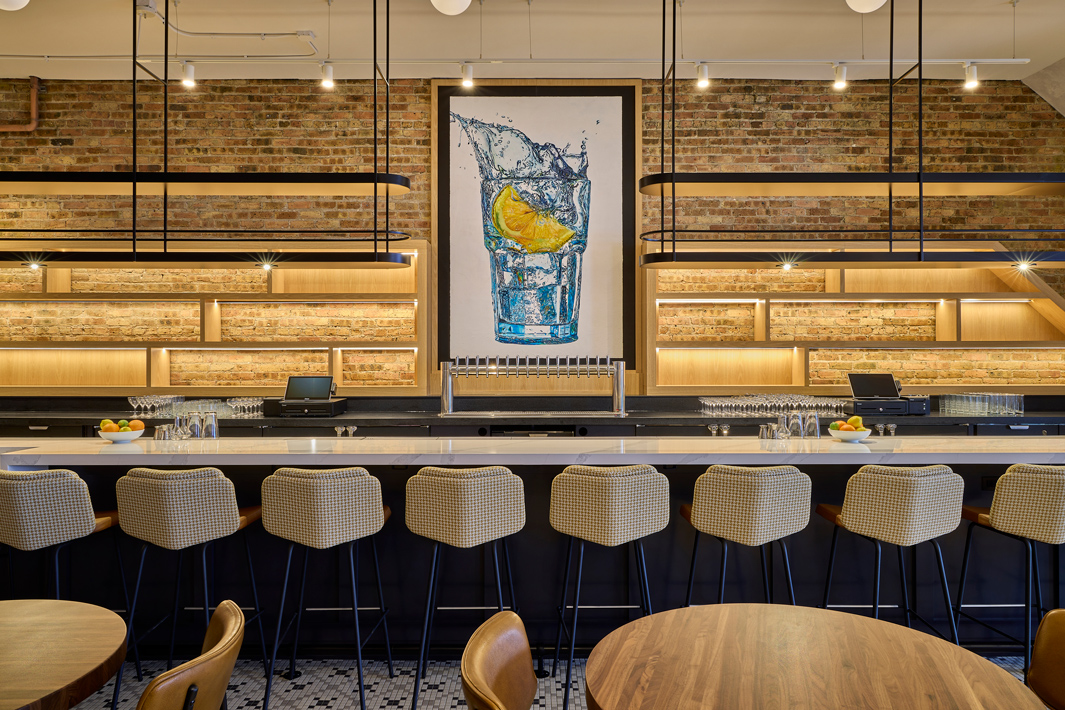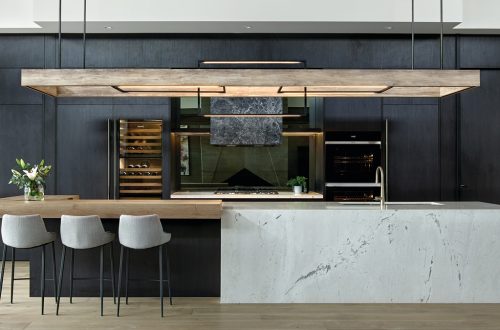For Joe Frillman, executive chef and owner of Daisies in Chicago, Illinois, food is a deeply personal act that often evokes memory and nostalgia—for better or for worse. It is an experience that invites diners to participate in a journey that can delight the palate, tie generations, and expand horizons, and it is also one that seeks a certain level of trust between chef and patron as the crafted dish becomes intimate sustenance for the body. And it is also an art and a vocation that captured his interest at an early age.
“We didn’t have cable growing up, so I watched a lot of PBS and at that time it was basically a whole block of cooking shows. I spent a lot of time watching Julia Child and Yan Can Cook and all of these programs that were public broadcasting. I got a job working at a farmer’s market and started learning more about food and produce and the differences in seasonality,” Frillman said. “Food was always the thing at parties everybody was focused on, that brought everybody together, and my earliest memories of my grandmother evolved around that.”
Frillman, an advocate for sustainably and ethically sourced ingredients and for creating opportunities in the industry for employees, farmers, and other purveyors, has more than 15 years of experience in the culinary industry. Though his foray into the culinary field began with a study in architecture at Northern Michigan University of Marquette, Michigan, he quickly turned his sight on the kitchen after getting his first taste of working in restaurants in the front-of-house at The Cubby Bear in Lincolnshire, Illinois. The interest, whetted by formative years where daily routine revolved around the table and an eight-acre farm in Prairie View, Illinois, led him back to culinary school.
“I started applying across the country and I ended up taking a culinary class with a local community college and just loved it. I really got involved with reading and books. It was the first time I really took the academic aspect of my life more seriously. I ended up doing a semester there and then transferred downtown Chicago to the Illinois Institute of Art to take classes,” Frillman said. “Culinary school, for me, was about meeting the right people who opened up the doors for me to get a job.”
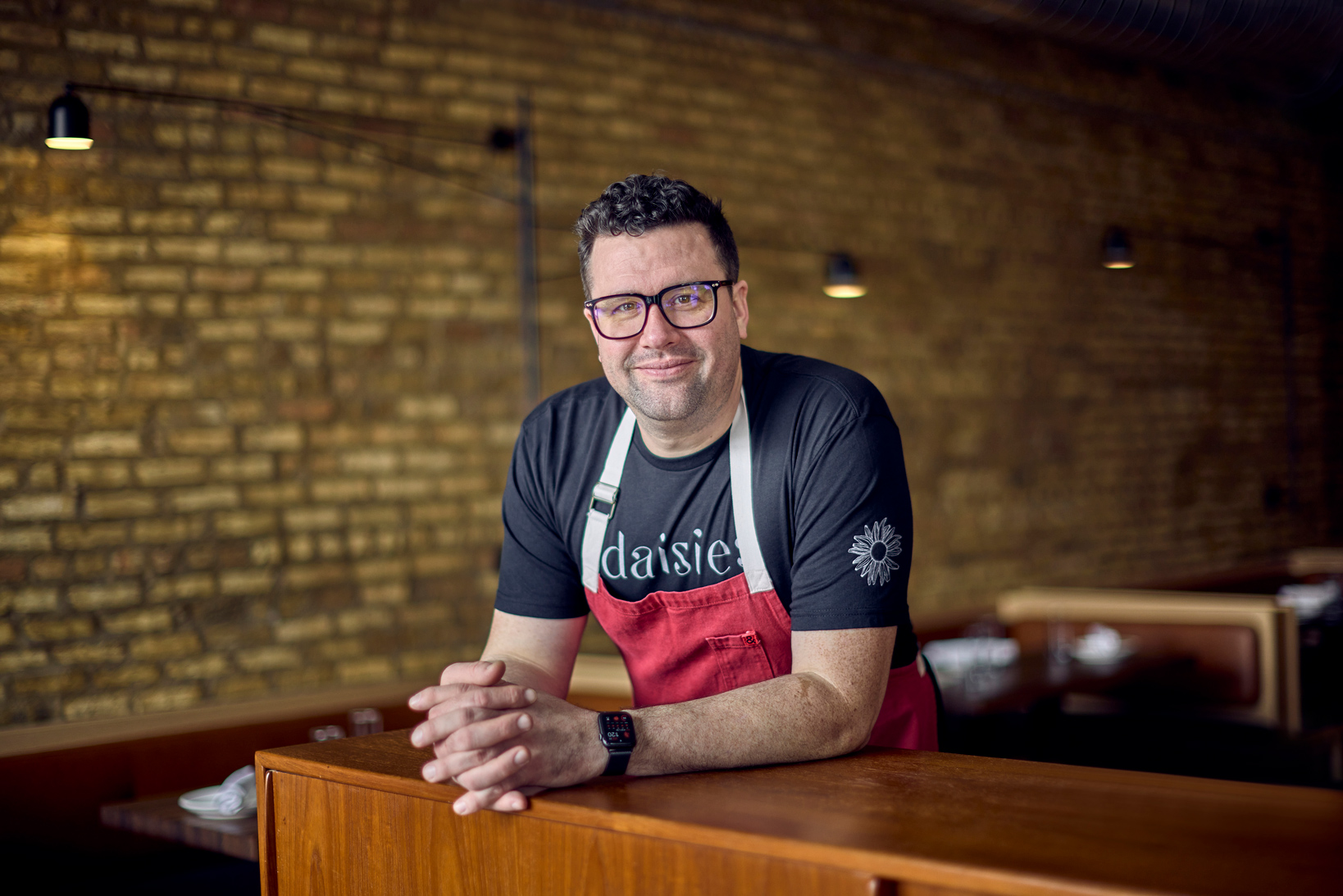
The chef
That very first job would take him to a pizzeria in Mundelein, Illinois, where he spent time doing dishes, learning how to make pizza, catering, and applying some of what he was learning about food and the history of cuisine and techniques with the introduction of new items. Frillman, who noted he basically worked for trade because the pizza was that good, then joined the opening staff at Osteria di Tramonto for Chef Rick Tramonto in 2006.
It was an experience that allowed him to work with well-known sous chefs of the time, who brought knowledge and experience working from establishments like Blackbird, Tru, and Trotter’s, and saw him work his way up from prep cook to Sous Chef under Executive Chef Jared Van Camp and Corporate Executive Chef Chris Pandel. When Chef Chris Pandel decided to open The Bristol in Chicago’s Bucktown neighborhood, Frillman—who had just returned from an apprenticeship at The Fat Duck, a three-star Michelin restaurant in the United Kingdom—took the opportunity to move to the city full-time to work at the restaurant and embrace its nose-to-tail, farm-fresh approach.
“Where I grew up is kind of a unique situation. I grew up on eight acres of property and across the street from us was a farm that had probably 150 acres, but we were surrounded by suburbia. My parents had bought the property in the early ’80s and the town basically grew around the piece of property. It was almost like a rural upbringing, but in a major suburb,” Frillman said.
“I was introduced to farming and produce and the seasonality of things with the farmer’s market, and it was literally growing in our backyard. When I met Chris Pandel, he basically introduced me to Italian cuisine and to me—I’ve been fortunate enough to spend some time in Italy—it is more of a philosophy. His cuisine showcased the simplicity and it introduced me to more of the philosophy of you eat what is in season, what is around you, with the best possible ingredients that you can find and you prepare them as simply as possible. To me, that is Italian food,” Frillman added.
Frillman noted he was challenged to understand the history of Italian culture and spent time reading about the origin and development of the regional culinary significance in Italy, and also spent time in Abruzzo, Italy where he worked on a sheep farm and creamery.
“Much of it is rooted in peasant food out of necessity. Some of the most iconic dishes that are around today are thousands of years old. It really intrigued me and growing up essentially on a farm, exposed to farmer’s markets, exposed to produce, it really pushed me to dive even deeper into it,” Frillman said.
“When we opened up The Bristol in 2008, it was a nose-to-tail, charcuterie. We would get whole animals and cook through every piece of it and there was a huge emphasis put on local farms and farmers and helping them, because they just had better products—not only that, but also their way of life and how things were raised and the differences in the supply chain in terms of commodity and industrialization as opposed to your local farm. We really wanted to support these individuals and get to know them,” Frillman added.
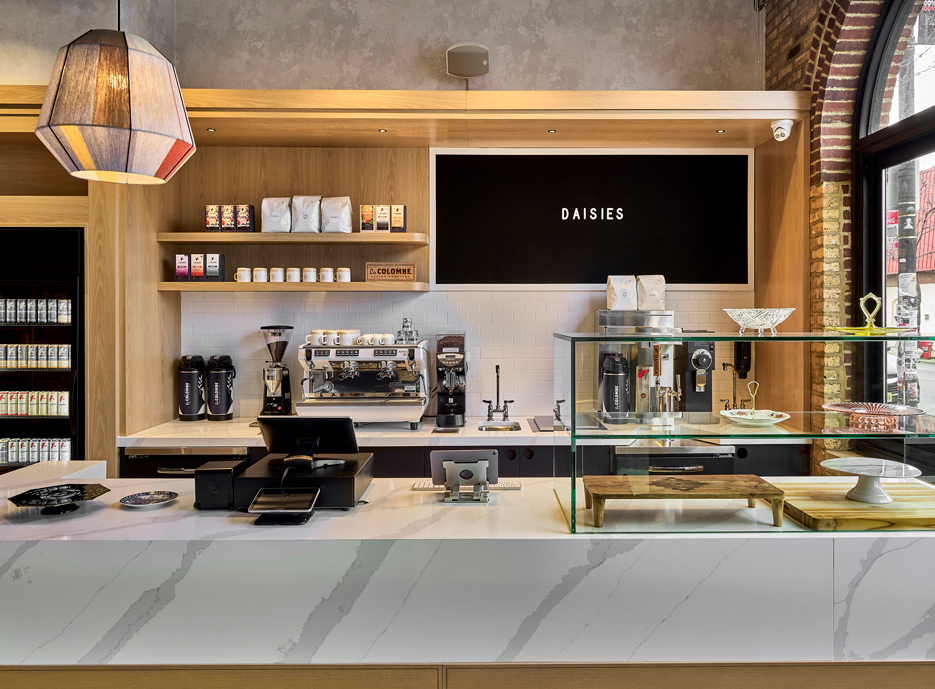
The philosophy
It was while at The Bristol Frillman met Marty Travis, seventh-generation farmer and partner at Spence Farm of Fairbury, Illinois, who helped cultivate a deeper interest in sustainably sourcing ingredients and supporting the surrounding agricultural community. When he then helped open the Balena as executive sous chef, Frillman said he convinced his brother, Tim Frillman, to take over the family property.
“We kept asking for local products that are even closer to us and we had this unique piece of property in the middle of suburbia that is a 25-minute drive from Chicago. The first thing we asked him to do was quail—why, I don’t know—and he was like, ‘I can’t do that,’ but he bought chickens and he started getting eggs and we started using the eggs for the pasta and I was like, ‘these eggs are amazing, is there any way you can grow things?’” Frillman said.
“He ended up growing kale and we had the buying power to take a ton of it and so then we just kept asking him for more and more. He quit his corporate job and took over the farm full-time and he supplies us with anything we can possibly get our hands on,” Frillman added.
Frillman Farms, an heirloom-only operation run and owned by Tim Frillman, is located in Prairie View, Illinois and has recently expanded to a second site in Berrien Springs, Michigan located about 100 miles from Chicago. Since its establishment in 2011, Frillman Farms has developed relationships with a number of other restaurants in the city—and largely drives the seasonal, rotating menu at Daisies. Launched in 2017, Daisies is a vegetable-focused, pasta-driven restaurant that embraces the Italian thought of eating what the land provides while wasting as little as possible. Named in homage of his grandmother, Daisy, it centers seasonality and simple preparation, and quickly became known as a neighborhood destination that invited guests on a culinary journey of Italian simplicity applied to the Great Lakes regional context.
“We try to get as many products as we can from the Midwest region and that Italian philosophy, if you will, became what the current restaurant theme embraces. We don’t live in Italy, I don’t have Italian heritage, I’m not from there—I’ve been there—but it was more of if we look at this and see the Midwest as a region of Italy, what would the food look like? That is basically what has driven us for the past six years as a restaurant and evolution of the restaurant with the ingredients,” Frillman said.
“There are a lot of similarities between what we do and the philosophy we take with what they do in Italy. Northern Italy you see a lot of butter, because of the climate. Southern Italy is a ton of olive oil, because that is what they grow. For here, it is similar. We have the cheese region of Wisconsin to the north and we have tons of butter. We have similar product and vegetables, but we have bacon, so you will see those ingredients subbed out. You are not going to see a lot of traditional Italian cuisine, but the inspiration is there if you look deep enough,” Frillman added.
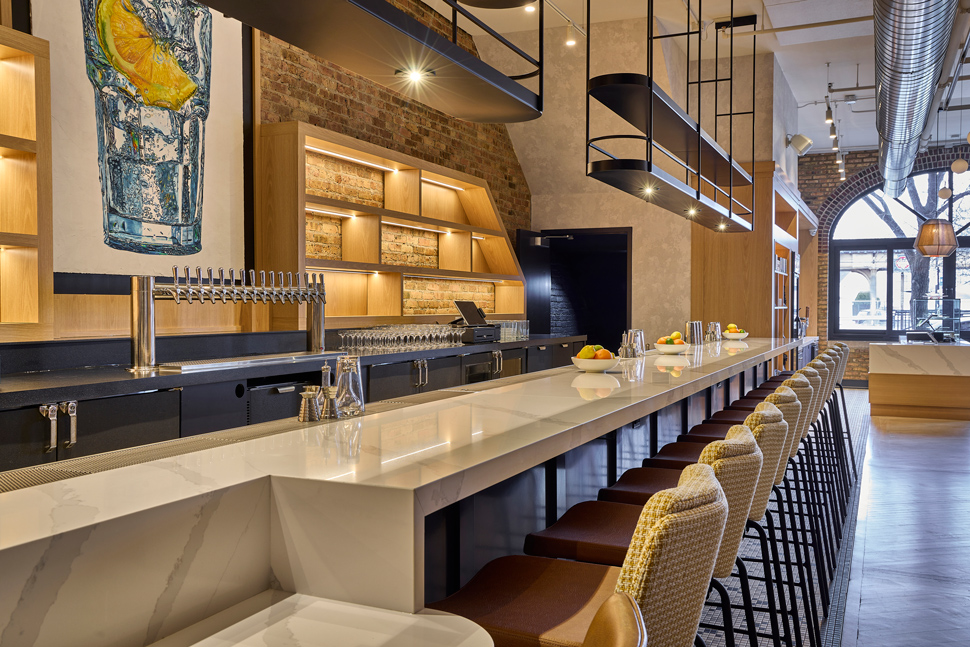
The pivot
It is a subtle and compelling approach that recognizes a timeless philosophy—and the iconic dishes inherent to Italy—and seeks to contextualize it for the Midwest. In 2018, Daisies was recognized with a Jean Banchet Award for Best Neighborhood Restaurant and ranked as a Bib Gourmand Recipient in 2019, 2020, 2021, and 2022. And in 2020, as the pandemic forced the restaurant industry to largely shutter its doors across the country, Daisies leveraged a simple, yet profound vision of bringing the culinary community, creativity, and purpose to the table as it adapted to an ever-changing landscape. The result was to redefine the traditional restaurant experience into one of diversified expression.
“COVID changed everything for us. We were a five-nights-a-week, dinner-only restaurant prior to March 17, 2020 and we would have stayed that way. We were busy, we were getting all sorts of attention from the neighborhood. The old space was a 66-seat restaurant expanded to about 110 with the patio if we were lucky, that had been a bar turned into a restaurant. It was not built for the numbers we were doing on a Friday or Saturday evening,” Frillman said.
“What COVID showed us is we needed to essentially diversify our portfolio of revenue, because if we didn’t adapt and pivot and move, we wouldn’t have made it. It was just out of pure grit and determination of the people who worked here to make it work and tread water, if you will, until we had the opportunity to find something that allowed us to really run with it,” Frillman added.
In an effort to retain and provide opportunities for employees—some of whom had worked with Frillman for 15 years—Daisies looked to solutions like delivery and takeout, a first for the neighborhood restaurant. Then, the team got a bit more creative.
“My brother called me and said he had just harvested all of the spring produce the night before they canceled his farmer’s market. He had paid for it all to be harvested, paid for the labor, and no one was going to buy it. He asked if I had any ideas and looking around in Chicago here at the rules and the laws that were established, grocery stores were still allowed to stay open because they were deemed essential. So, we said, alright, let’s open this restaurant as a grocery store and called a bunch of our friends who were in similar situations as my brother and we ended up having an indoor farmer’s market,” Frillman said.
Highly popular, the farmer’s market concept provided a platform for farmers to sell their produce, people in the neighborhood to sell products, and the restaurant to sell made-from-scratch pasta by the pound, jar-canned sauce, and ingredient-driven meal kits. Daisies also brought in Leigh Omilinsky, a Jean Banchet award-winning pastry chef—now Executive Pastry Chef and Partner of Daisies—to make and sell pastries in the converted restaurant space. Frillman noted as the team continued to build on the versatile concept over the next couple of years—even purchasing a van and some coolers to continue selling their pasta and sauces at farmer’s markets as they returned in 2021—the notion of returning the space into a restaurant as its sole function prompted a search for a larger space.
“We just had an unbelievable amount of people who were looking for our product and they weren’t thrilled with the fact that all of a sudden, we were planning on stopping. We needed more production space and we needed a bigger facility,” Frillman said. “It was all in an effort to retain and provide opportunities for employees, for career growth, for advancement from a knowledge perspective. We talked about it for a long time, and we decided to move the restaurant and in moving the restaurant, Omilinsky [came on board] as a partner with us.”
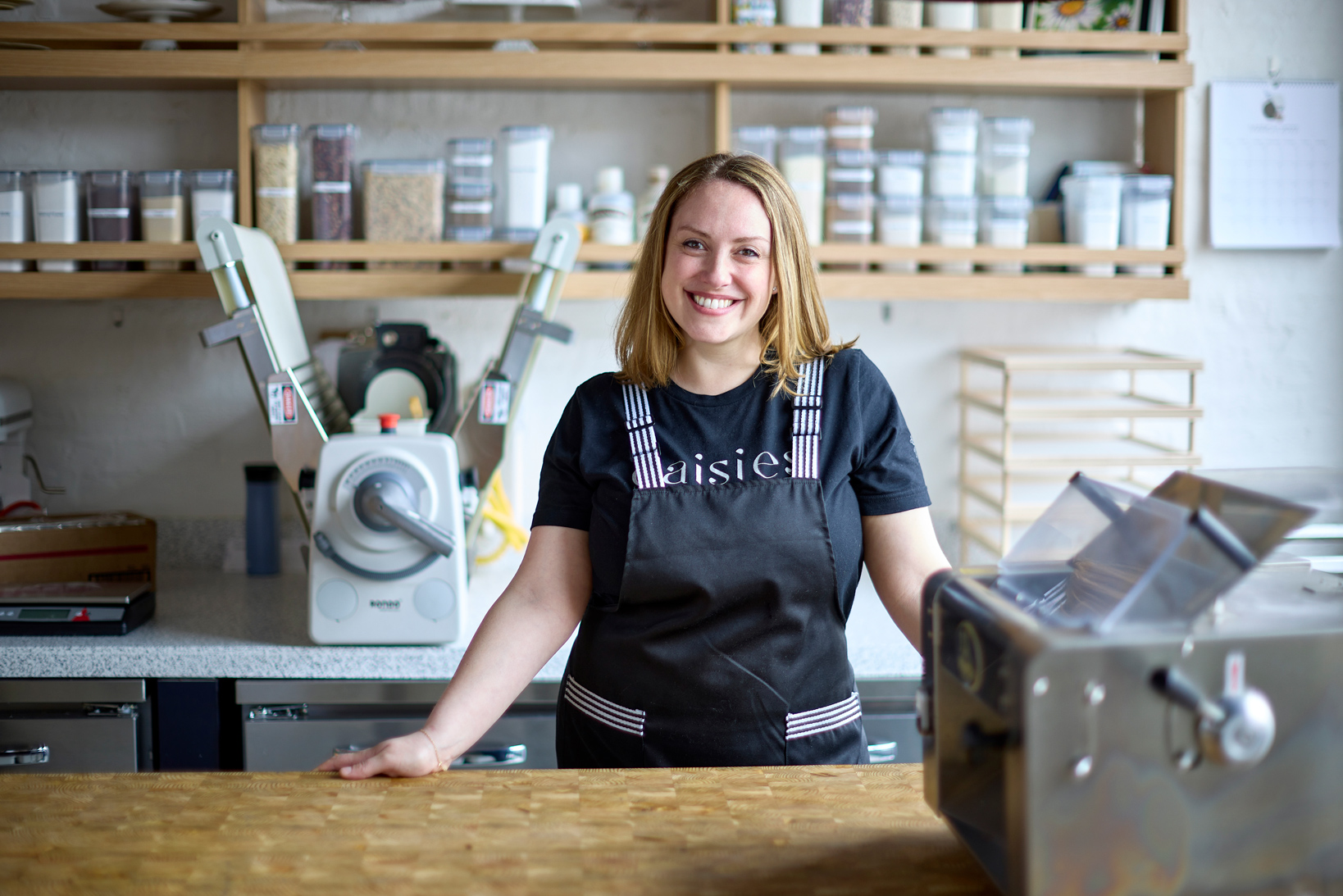
The move
The site, a former restaurant space located just a few blocks down the Milwaukee Avenue corridor in Logan Square, would serve as “a mothership hub” for the Daisies team as the creative solutions explored during the pandemic would continue in the new 5,500-square-foot space. Complete with a matching basement footprint, the site would provide roughly 10,000 square feet of space to pursue the restaurant’s various endeavors such as the build out of a pastry shop, private dining room, a production kitchen, and a full-service restaurant. The space would also provide a place for interactive programming like cooking and pasta making classes, collaboration dinners, and charity and community events.
“It reminds me a lot of the old space. It is very nerve-wracking, especially in the restaurant industry, to meddle. If things are going great, moving a restaurant is a risky endeavor and we had built such a neighborhood clientele of repeat guests and families who would come in and we would see them all the time,” Frillman said. “We had to make sure that what we were doing next was going to have some semblance of the old place. It couldn’t be brand new and forget the history and the past of the restaurant.”
To complete the renovation, Frillman looked to fc STUDIO inc., an architecture and design firm specializing in hospitality, commercial, and luxury residential work. Founded in 1999 by Julie Fisher and Rachel Crowl, fc STUDIO is also WBE, ACDBE & LEED AP BD+C certified and has developed a portfolio of work across North America. For Rachel Crowl, co-founder and partner of fc STUDIO, the opportunity to work with Frillman on the next iteration of Daisies was an exciting prospect for the firm, especially since they were already big fans of the existing restaurant.
“I’m a maker at heart. It is all about the making. My business partner and I started the firm in 1999 after working together elsewhere in the industry of architecture and brought to it that maker mindset, and really enjoy working directly with the people who are bringing spaces to life, that behind-the-scenes sort of spirit is our inspiration. And it goes beyond there, I mean working with great people, especially in businesses that love and care about creating environments that further their cause and vision is something we really enjoy,” Crowl said.
“It starts with listening to our clients. This isn’t about us expressing our tastes and likes. It isn’t that we have one look or feel, this is about deep listening and trying to design around what our clients need and want and even creating things they haven’t thought of to help them achieve that. That said, within the hospitality sector, it is about creating environments that not only operate, helping the business be more successful, but also there is a lot of respect to the budget,” Crowl added.
Crowl, who is also co-owner of Folkart Restaurant Management with husband and Chef Matthias Merges, also noted as great consumers of hospitality and married to a chef, there are number of overlapping features that foster a personal love for the field. It also a mindset that transcends typology, as more commercial environments integrate hospitality experiences, and when Frillman reached out to them to help realize a new vision for Daisies that captured a sense of its original space, it began with a process of deep listening.
“What were the pain points, and what were the elements of success that we wanted to make sure we weren’t overriding in the new space? We very much wanted to create version two, like the next step for Daisies that let the business thrive within a new environment. We did a lot of listening on where the business had needs, where the customer had needs, what was to be communicated outward to the community, and the broader public about what the Daisies brand is,” Crowl said.
“The other factor was with it being a former restaurant space, how do we take away any of those original branded feelings, experiences, in there—because we know sometimes re-concepting a space isn’t always successful with the public. We worked very hard to ensure it felt like a different space inside even though we weren’t tearing down the kitchen and we were working with the same entrance,” Crowl added.
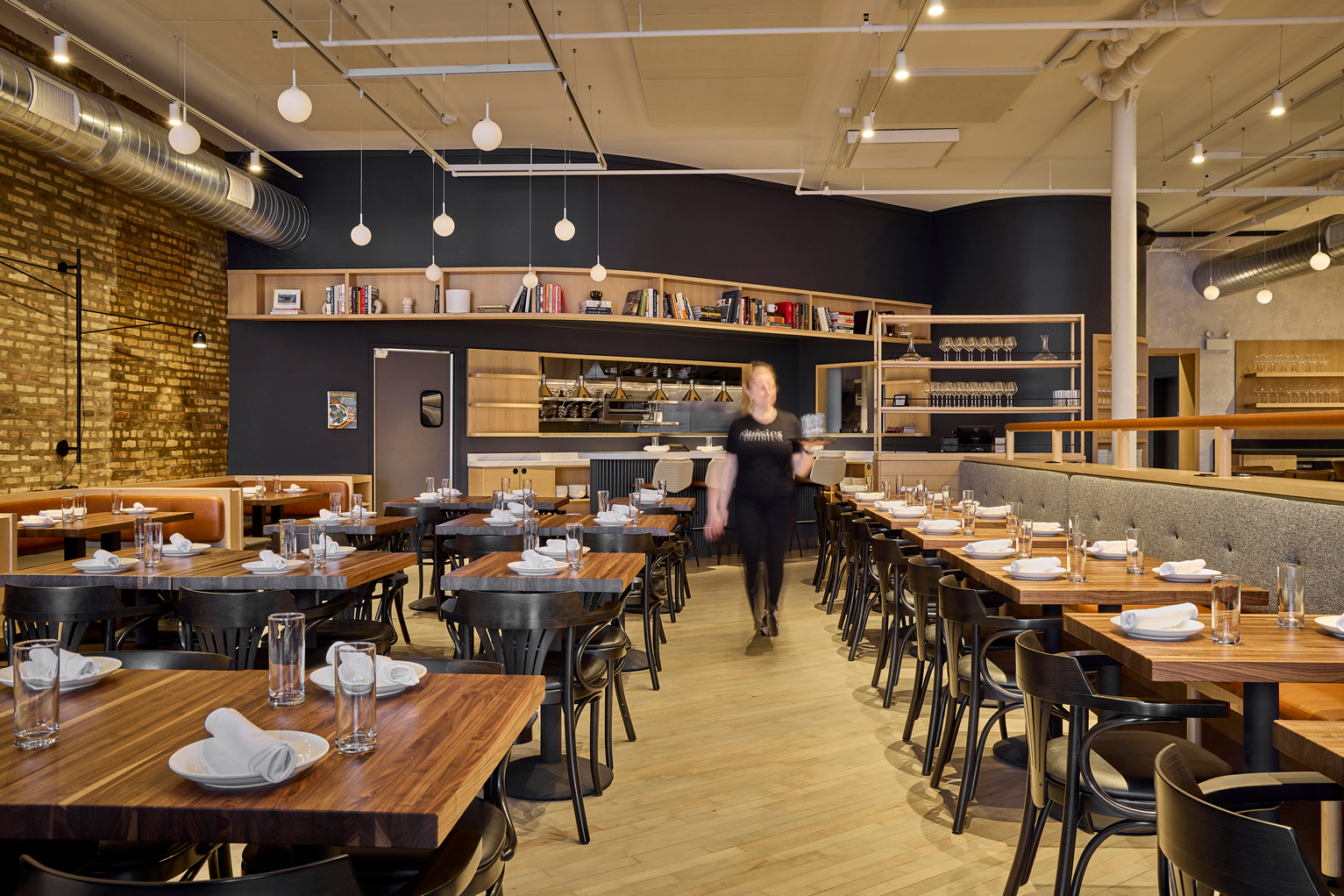
The space
Though the team had to navigate constraints like existing entrances and access points and a narrow floorplan that challenged access to natural light deep into the space, fc STUDIO transformed the Flatiron-like building space into a dining environment that people would want to return to time and again. Crowl noted they were really cognizant of treating both finishes and the physical features of the space to allow daylight to permeate the footprint, and establish the environment as supporting role to the culinary experience.
“It really needed to support what the Daisies brand is and communicate it, and provide a backdrop for it that really lets the culinary and beverage side be the main player in the space. There is a restraint to it to let that culinary side be the main player, the lead role, if you will,” Crowl said.
“We like to do micro environments inside hospitality spaces so people can seek out the corners and nooks and other experiences. What we did was create an entrance in the same opening of the façade, but then we turned it so the entrance sequence takes you by the new marketing and pastry display, which will support the operation especially in the morning and during the daytime when the restaurant is not its main service model,” Crowl added.
The new sequence introduces customers to this new aspect of the Daisies brand, expanding upon the pastry operation Omilinsky provided in the former space, and continues the market takeout model that began during 2020 with the sale of pastas, sauces, and other culinary products. There is a restraint and simplicity to its design that reflects the overall Daisies brand, allowing the made-from-scratch dishes and passion that drives the culinary team to shine.
“Joe Frillman is a great chef and as an owner-operator really cares about every detail. I love working with the owner-operator mindset because it is personal. It gets fine-tuned in how they prefer to run their service, how they want to interact with their guests, how they want to be perceived by their guests, and how they want the action of what they do to be part of the theater of the restaurant,” Crowl said.
Frillman said there is something powerful about the sharing and the tradition of food—especially as he shares dishes with his kids he can remember having with his grandmother—and design is no different.
“It is the setting of where those meals are consumed or cooked, prepped or grown. The setting you are in while you are embarking on the journey of the meal you are eating can drastically affect it. I was a little bit conscious about leaving the previous location—it was a small, intimate restaurant that was too busy for its size so a lot of time it led to an uncomfortable eating environment, especially in a post-COVID world,” Frillman said.
“If it is too hot, if it is too cold, if you are in a stark white environment as opposed to a dimly lit space—I mean so much of that is purposefully thought of and that is part of the reason we chose to work with fc STUDIO. This is what they do. They design restaurants and bars and the vibes of the restaurants and bars I have frequented that they have created was exactly what we were looking for, and so those go hand-in-hand,” Frillman added.
For Crowl, the project was a great experience, working with a person who built the brand and brought that energy and commitment to designing the space.
“Design is also a passion and a hobby and so my whole life is informed by it. It is what I like to do in my downtime and make a living. It is something that I think aids in a quality of life, it creates in the smallest way traction for your day, it can create inspiration, it can create relief,” Crowl said. “And it has the capability of aiding us in all of our moments going through our lives.”
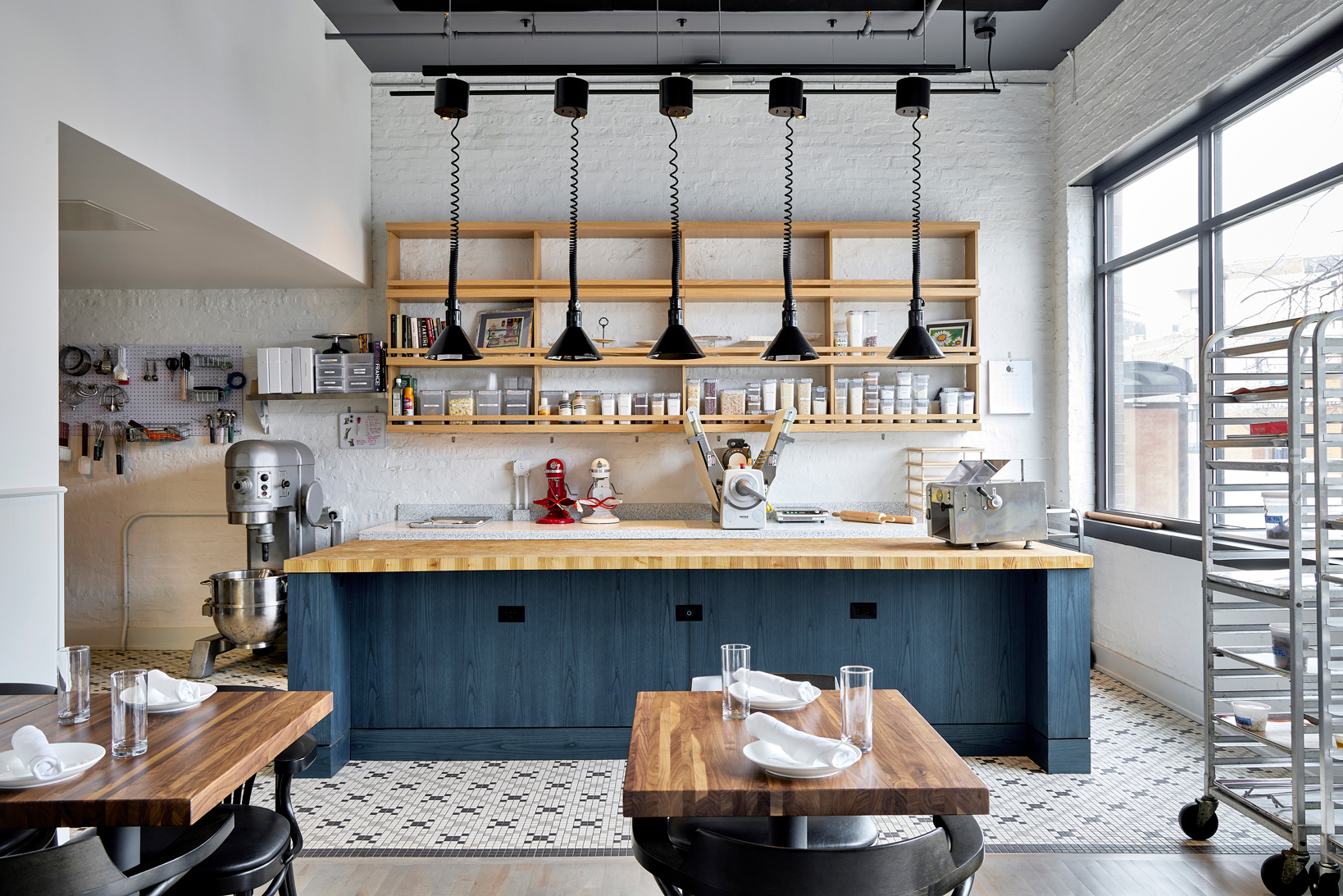
The catalyst
Debuting Spring 2023, Daisies’ new site is just one of the brand’s latest developments. To continue to meet neighborhood demand, Daisies will continue to offer fresh seasonal produce in its original space as it transitions into a full-time grocery, farmstand, and venue for lunch options and a tentatively planned concise dinner and cocktail menu. Frillman has also announced the launch of a newly formed collective known as Radicle Food Group, building on that vision in 2020 that brought the culinary community, creativity, and purpose together. Radicle Food Group, a vehicle and platform in which to support and grow opportunities for those who work and partner with him, envisions Daisies as a catalyst, anchoring the restaurant as the taproot and creative seed for the future.
“I found a group of people I really enjoy working with is what it comes down to, and we want to help expand their opportunities and in doing so it helps everyone. It helps us as a group, it helps them advance their career and their family, but also by moving from the old location to the new location, we more than doubled our staff. We went from 30 to almost 70 and for me, it’s about creating jobs, it’s about creating opportunities for people,” Frillman said.
“Radicle, for me, is a play on words. Everybody here is radical, we are trying to change a lot of this industry, and it is also the taproot of a plant and from the Daisies perspective, it was like, alright, this is the root, and the root of the group is going to seed the rest of it. We already have plans and concepts of what we want beyond the grocery store, and we want to expand and take advantage of it. We have the opportunity to really lean into this massive pile of lemons we have been served for the past few years and make this the most refreshing lemonade we possibly can,” Frillman added.
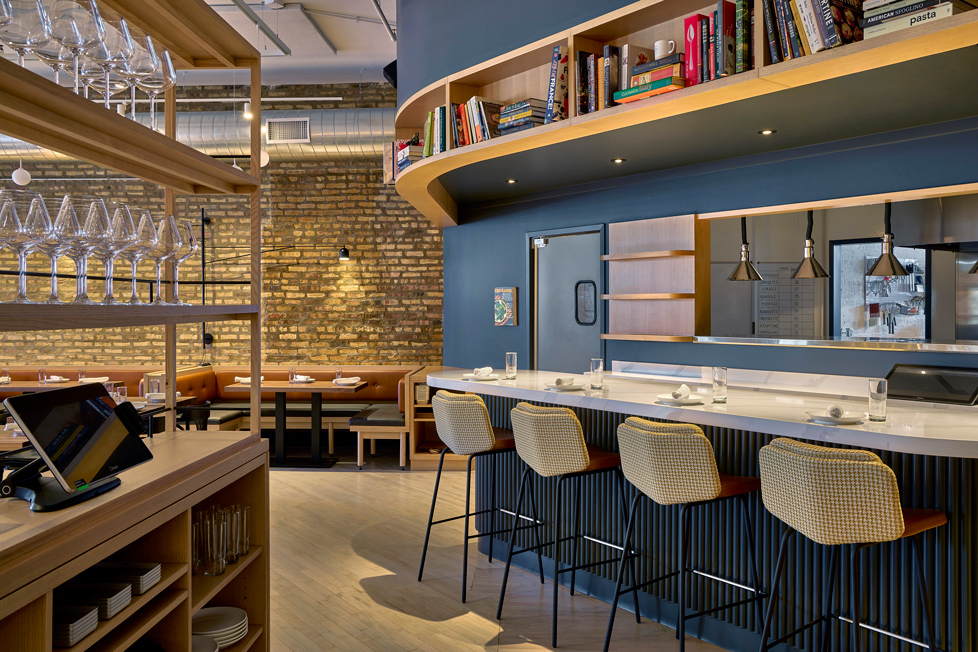
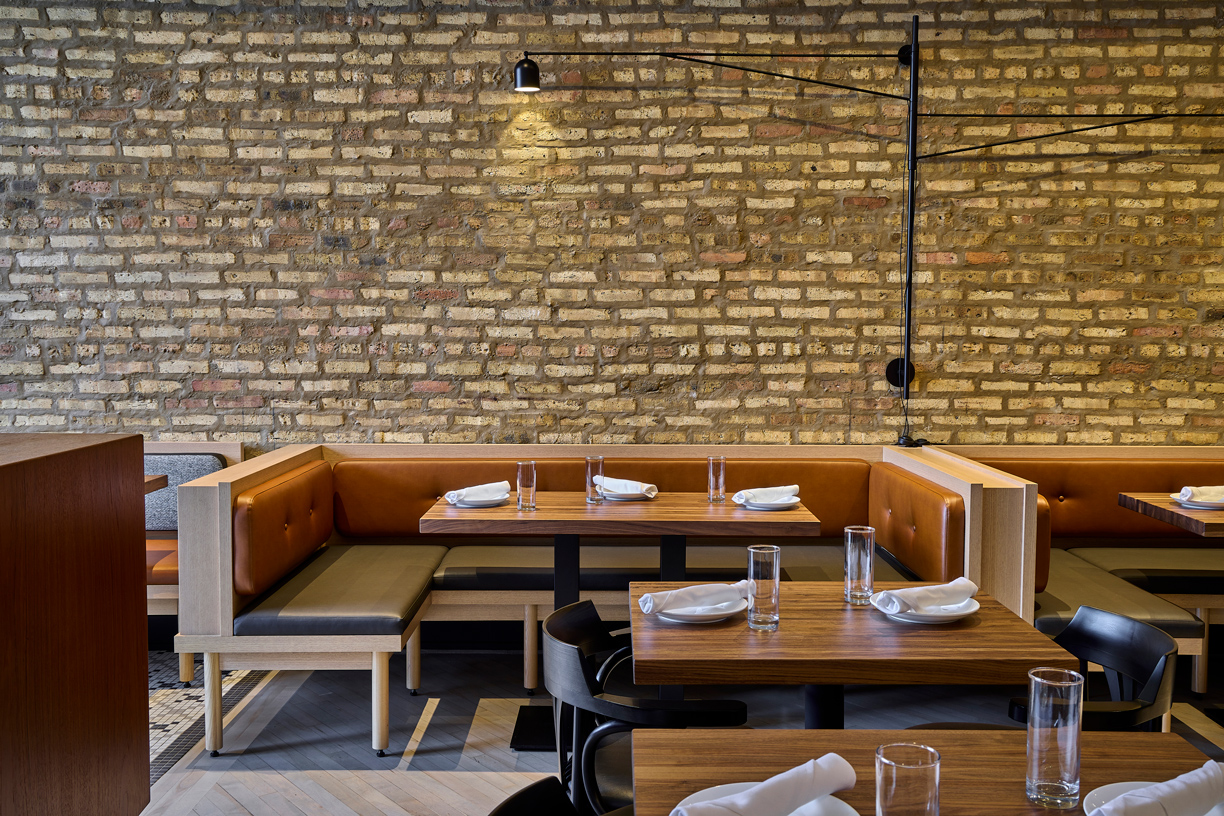
First published in Great Lakes By Design: In Flight, 2023
Text: R.J. Weick
Photography: Courtesy Neil Burger

